- Home
- Kristan Higgins
Always the Last to Know Page 15
Always the Last to Know Read online
Page 15
“Seriously?” she said. “I mean, great! It’s a . . . unique property.”
It was.
“You’re an idiot,” Juliet said, tilting her head to squint at the house. It did look straighter that way. “Looks like it’ll collapse in a strong wind.”
“Ah, what do you know? You’re just an architect. By the way, do you do any pro bono work?”
She smiled a little, which was nice to see. Jules hadn’t smiled much since Dad’s stroke. She did have a point about the building in front of us. But I was one of the few people in Connecticut who viewed an eleven-hundred-square-foot house as spacious, and if there was another house I could afford in Stoningham before I won Powerball, it was invisible, like Wonder Woman’s plane.
“I’ll draw up the papers,” said Ellen, getting into her car before my sanity was restored.
“You can live with me, you know,” Juliet said.
“We’d kill each other. It might scar the girls, seeing their mother and aunt lying in pools of blood.”
“True. Well, you have a nice view, I’ll give you that.”
“That’s why I bought it,” I said, turning around to look out to sea, like the wife of a sea captain from long ago. Or like a regular person who enjoyed pleasant views. Because the view was incredible. The house, teetering though it may have been, was on what had become a nature preserve, which meant it couldn’t be expanded or torn down for a rebuild (which is what would’ve happened in a heartbeat otherwise, and a grotesque “cottage” would sit here now). Ten years ago, a monster storm had devastated this area, and none but this house had survived. The owner died in the fall, and the market for tiny, decrepit houses was soft, so I was in luck.
“You haven’t signed anything yet,” Juliet said. “It’s my professional opinion that you shouldn’t. I happen to know a few things about buildings, Sadie. This is a money pit.”
“I enjoyed us getting along for ten minutes,” I said.
“Seriously. You’ll regret this. I can loan you some money for a rental if you need it. A rental with a flushing toilet and everything.”
“I’m only staying in Stoningham till Dad gets better, and I’m not working. I’ll spruce this place up, slap on some paint and sell it at a profit.”
“Stop watching HGTV. It’s all make-believe.” She sighed and looked at me critically, as our mother taught her. “Hard to believe you have enough money for anything more than a paper bag.”
“Please. I can afford an entire refrigerator box.”
“You’re a teacher at a Catholic school.”
“It’s my art, Jules. Some people actually like what I do.”
She got that constipated look I loved so well.
As an architect of super-fabulous buildings, my sister could have recommended me to some of her clients, or commissioned me to make lobby art for, say, that corporate headquarters she designed in San Fran a couple of years ago.
She did not. She wasn’t in charge of artwork, she said, and besides, DJK usually went with . . . other artists.
By which she meant important artists. And hey. I got it. Plus, I didn’t want to make it because my sister used nepotism and threw me a bone. Still, it would’ve been nice to be able to turn her down (and have her competitors start a bidding war for me, but so far, nada).
I put my hands on my hips. “Well, I have my work cut out for me. Want to drive me to Home Depot?”
“Will you let me make you a list, at least?”
“No thanks! I got this.” I smiled.
Her jaw hardened. Oh, it would drive her crazy to have me buy laminate flooring, some fake plants and a couple of throw pillows to sex the place up, but that was exactly my plan. There was nothing wrong with Ikea chic. I should know. I’d been living with it since college. My apartment was currently drawing $175 a night on Airbnb, thanks in large part to my new throw pillows.
I’d make this house adorable, too, thank you. And, as my mother pointed out, I did have a rich boyfriend. If he wanted to help me out, that would be quite lovely, especially as I was ninety-five percent sure he was going to propose, now that Dad’s crisis had stabilized and he was on the mend.
“Instead of having me chauffeur you around, why don’t you borrow the Volvo while you’re home? That little shitbox you’re renting is a death trap. You get hit in that, you’re dead.”
Death trap, money pit, shitbox. So judgy. “Can I have your Porsche instead?”
“No.”
“I had to try. Sure, I’ll take the Volvo. Thank you so much, Jules.” It was awfully nice of her.
She nodded. Pushed her hair back and sighed again, looking at my house.
“Everything okay, Jules?” I asked. “Aside from Dad?”
“Sure. Listen. About Dad. I think you better . . . prepare yourself. He might be like this for the rest of his life. Which could be really short.”
“Jesus. Why don’t you dig his grave while you’re talking?”
“Just facing facts.”
“The facts are, the brain is very elastic. People have come back from far worse. Clara, that nurse at Gaylord? She said they’ve had people in comas who—”
“I know,” she snapped. “I was there, remember?”
“Well, don’t you want him to get better?”
“Of course I do!”
“Then stop being so pessimistic! A caregiver’s attitude can really affect—”
“Get in the car, okay? I have to help Brianna with a history project.”
* * *
— —
Two days later, it was official. I was a property owner.
My house—such nice words, my house!—did need a bit more work than perhaps I acknowledged, now that I was here. Alexander, who was in Sausalito at the moment, the poor bastard, had very sweetly covered the cost of moving my furniture from Juliet’s to here, and the movers had just left after cursing and sweating and wrestling my bed up the narrow stairs, for which they received a generous tip. Otherwise, I had a couch, a table for two, a chair and some pots and pans and kitchen stuff. A couple of lamps. My books and pictures were still at Juliet’s, but I wanted to sleep here tonight and get the feel of the place.
I also wanted to put some distance between my mother and me. Her disapproval of whatever I did, had done and would do seeped into every interaction we had. Even my care of Dad seemed to irk her, and her own lack of tenderness irked me right back. I had paintings to do, and she hated the smell. Even though their house was huge, there never seemed to be enough room for the two of us.
Hence, my purchase.
Perhaps not the best decision.
Did I mention I had no neighbors? Fifteen years in New York City had made me used to that safety in numbers thing. In the entire time I’d lived there, I’d never once been scared.
But I was kind of scared now. What if Connecticut had a serial killer? What if those giant coyotes that ate cats marked me as a slow runner?
I should get a dog. I would get a dog. I glanced at my watch. Shit. Six o’clock and already dark. Allegedly, my heat was on, but it was cold in here. I did have a fireplace, but Jules told me I’d burn to death if I tried to make a fire.
Maybe I’d go to my parents’ house to sleep. Get the dog tomorrow, preferably a large, vicious, loyal-to-only-me type, and see if Alexander would be back from California and wanted to spend the weekend in scenic Connecticut doing a little house renovation. We’d be a team, like that irritating couple on the house-flipping show that I did indeed watch. Except that we’d be adorable. In fact, maybe we’d get our own show. I knew art and had great taste, and Alexander was rich and photogenic. What else did you need?
The knock on the door made me scream.
“Jesus!” yelled the person. I peeked out the window.
It was Noah.
No baby this time. Just him, looking irritable
and beautiful.
“Hi,” I said, opening the door.
He didn’t answer.
“Hello, Noah,” I said, enunciating.
“Your mother sent me.”
I sucked in a breath of cold air. “Why? Is my dad okay?”
“He’s fine. She wanted me to check your house.” I closed my eyes in relief. “But I can go if you want. Which would be my preference.”
“You’re so very sweet, Noah. Come on in. What little heat I have is racing out of here.”
He came in, brushing past me.
Damn. He smelled so good—wood and polyurethane and laundry detergent. “How’s your baby?” I asked.
He deigned to allow half his mouth to twitch in a smile. “He’s great.”
I nodded. “Good. Well. What do you think?”
“Money pit.”
“That’s what Jules said. I’m glad you let your hair grow again, by the way.” No, Sadie. Nope. Don’t say that. Too late. You did. “I saw your picture on Facebook. That’s all. Nothing big. I wasn’t stalking you.” Please stop. “It was when you were engaged, that’s all. All our classmates were talking about it.” Sigh.
He just looked at me with those dark, dark eyes. As opposed to looking at me with his teeth, for example. God. I needed a drink.
You have a boyfriend, some distant part of my brain sang happily. He’s very nice to you! You almost always have an org—
“I don’t like the sound of that furnace,” Noah said. “Okay if I go downstairs?”
“Sure! Yeah! It’s super dark, though, because there’s no light down there. Which is what happens in the absence of light. Darkness.”
“Are you drunk?” he asked.
“I wish. I’m just feeding off all that brooding masculinity of yours.” I snorted and regretted it deeply.
Noah sighed, took a flashlight out of his toolbox, which I hadn’t noticed before, and found the cellar door, which was easy, because it was right in front of him.
I took a few cleansing breaths. Texted Alexander that I missed him.
It would just take some getting used to, seeing Noah again. He was my first love. Of course I still had a soft spot for him. There would always be a place in my heart for—
“Sadie! Can you come down here and hold the flashlight, please?”
“Coming!” I groped my way down the stairs. Lightbulbs. I definitely needed to buy some lightbulbs. Shouldn’t have dismissed Jules and her list quite so fast. Noah was at the hulking black thing (furnace, I assumed), doing something with his hands. Something manly and hard and dirty.
He handed me the flashlight, which I pointed in his eyes. “Sorry,” I said, shining the light at his feet.
“Your filter is filthy.”
“So are my . . . never mind. Filthy filter. Got it. Should I call someone? Or buy something?”
“You have someone.” Oh, my heart! “I’ll be right back.”
“Are you—” Nope. He was already up the stairs. I heard my front door bang closed.
I had to get a grip. Yes, he was gorgeous. What did I expect? That he’d become Nick Nolte in my absence? And yes, that brooding Jon Snow act was doing things to my lady parts.
But he had a child, and I had a serious, long-term, almost engagement going on, and Noah didn’t even want to be friends. I could respect that.
Except it seemed to trigger dirty thoughts that had the added benefit of irritating him, which, I had to admit, was kind of fun. Maybe I was just overtired. Maybe I needed something to distract me from Dad’s condition, which made me cry if I thought about anything other than a full recovery. Every time I thought about him, lost in his own brain, panic slithered around my heart.
Whatever the case, I shouldn’t mess with Noah.
But once, we’d been so happy together.
Noah came thumping down the stairs. “This is a furnace filter. You need to change it once a month on your model. Watch me so you can do it yourself next time.”
I watched. It didn’t seem difficult, not in those capable hands. That frickin’ beautiful hair. His soft voice. I bet he was a great dad.
“All done.”
“Okay. Thank you.” Finally, a normal sentence. “Are you seeing anyone these days?”
“Not your business.”
“Sorry.”
We went upstairs—him in front, which gave me a perfect view of his ass, and I’m sorry, how could I miss it? The radiators were clicking with what I assumed was heat.
“I appreciate this, Noah.”
“Don’t do any construction on this house without checking with me, all right? I might not like you anymore, but I don’t want you dying. Your mother would be crushed.”
“Or relieved. But yes, I see your point.”
He finally looked me in the eye, and his expression softened a little. “I really am sorry about your dad.”
“He’s getting better. You know, when it first happened, I was scared, but he’s . . . he’s good. He’s improving.”
“I brought Marcus over to see him the other day. You were at the grocery store, LeVon said. I hope that’s all right. We, uh . . . we visited him at Gaylord, too. Figured it would be okay.”
The image of my first love, bringing his beautiful baby to my father, punched me in the heart. “Thank you, Noah,” I whispered. My eyes were suddenly wet. “It’s really kind of you.”
He nodded once. “Well. Enjoy your new place.”
“Thanks. Have a nice night.”
“Don’t tell me what to do.”
And there it was, that tug of a smile on his beautiful face. Then he was gone, and my house was warmer because of him. The quiet settled around me, bringing with it all the memories of how Noah and I had failed each other.
CHAPTER SIXTEEN
Sadie
I thought when Noah came to visit the city I was obsessed with, he’d understand. He’d never been to New York before, aside from the obligatory eighth-grade field trip. I wanted him to drink in the architecture, the life and pulse of the city. I thought he’d appreciate the glittering skyscrapers and gracious brownstones, the cobbled, uneven streets of SoHo, the thrum and rush of noise, the smells of street food and the variety, my God, the newness of every single block.
He came to visit for the first time on Columbus Day weekend of my freshman year. He didn’t love a thing. In fact, he hated it. “How can you live here?” he asked the second night, rubbing his forehead. “You can’t hear yourself think. How do you paint?”
My mouth dropped open. “I’m getting really good!”
“You were good already.”
I made a disgusted noise. “Anyone can do a pretty landscape, Noah,” I said patiently. Landscapes had been my forte in high school, and they won me those prizes at our town’s art contest (which meant nothing, I had quickly learned). “I’m really growing as an artist. It’s mind-blowing, what I don’t know yet, and how good I could get.”
I stopped in front of a gallery; we were in SoHo, and you couldn’t swing a cat in this neighborhood without hitting a posh space staffed by black-clad beautiful people who spoke three languages. “This is art,” I said, pointing to the sole oil painting in the window. “It’s so much more than a pretty picture. This says something.”
“Looks like blobs of black tar to me,” he said.
“It’s a statement on materialism and abstraction,” I said. “There’s a tension here, a grittiness and impact. It’s a dissonant whole worldview about what’s real and what we want to be real.”
“It’s black blobs, hon,” he said. “That painting you did of the blood moon rising? Now that’s beautiful.”
I sighed. “Yeah, well, I’d kill to have been the one to come up with this. You know how much it goes for?” I knew, because my class had had a field trip here just last week (hence my knowledge of disso
nance and such). “Three hundred thousand dollars, Noah.”
His eyebrows jumped. “Jesus. But then you’d have to look at the goddamn thing. Whereas if someone bought one of your paintings, they could actually feel happy.”
“Noah . . . knock it off.” But I smiled, even if I felt somehow slighted by his compliment. Happiness because of a painting? How plebeian. Why not just frame a picture of your dog? (I mean, yes, I did have a picture of my dog, the late, great Pokey, who died when I was eleven.) But art was supposed to do more.
I went home for Christmas break, but only for ten days, because I was going to Venice for the remainder. And oh, that beautiful city was everything I’d imagined. It spoke right to my heart, the crumbling buildings, the canals, the decrepit, genteel beauty, the patterns of bricks, the beauty imbued in everything, even the rainspouts. I loved the garbagemen who chatted animatedly with each other, smoking, but who paused to give me an appreciative glance with “ciao, bellissima.” The riotous glory of stained glass in every church, the beautiful window boxes and brightly painted shutters. I took the water taxi to Murano and watched handsome men blowing glass, their arms brown and scarred. The beauty of the city, the foreignness of it, filled up parts of my soul I didn’t even know I had.
When I got back to school, I signed up for a summer session in Barcelona and found a waitressing job so I could pay for it.
A quick trip home, travel on break, back to New York. It became my pattern. My painting changed; the gentle landscapes that had gotten me into Pace were cast aside. Now I did mixed-media and monochromatic paintings. I tried sculpting. I started wearing only black (I know, I know). I got my nose pierced.
Noah visited when he could, which wasn’t often. He was apprenticing as a carpenter, working six days a week. When we were together, in bed, skin against skin, his light scruff gently scraping my cheek, our fingers intertwined, the red glow returned. But he kept asking about the next break, when I’d come home. When I did go back to Stoningham, I felt itchy—my mother, still the same but only on more committees; Juliet, securing her status as favorite by giving birth to a girl she and her perfect husband named after my mother.

 In Your Dreams
In Your Dreams Just One of the Guys
Just One of the Guys The Perfect Match
The Perfect Match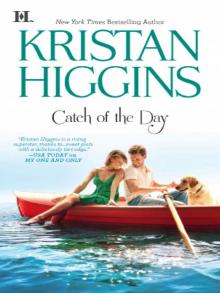 Catch of the Day
Catch of the Day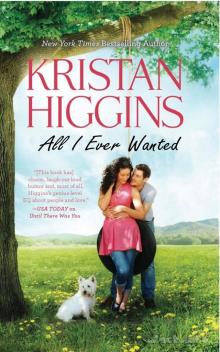 All I Ever Wanted
All I Ever Wanted Until There Was You
Until There Was You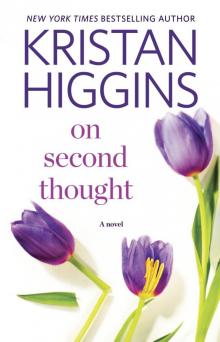 On Second Thought
On Second Thought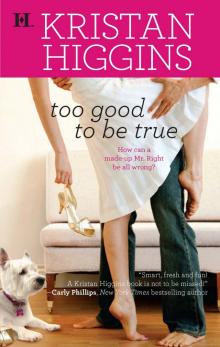 Too Good to Be True
Too Good to Be True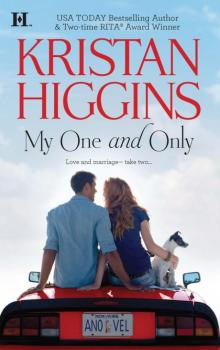 My One and Only
My One and Only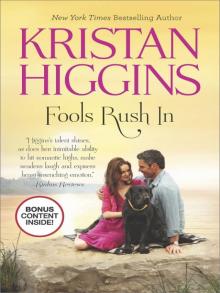 Fools Rush in
Fools Rush in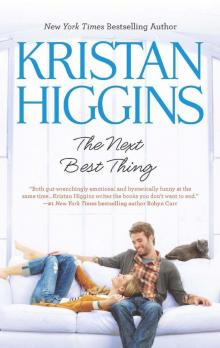 The Next Best Thing
The Next Best Thing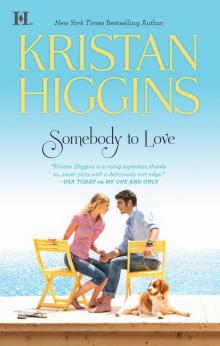 Somebody to Love
Somebody to Love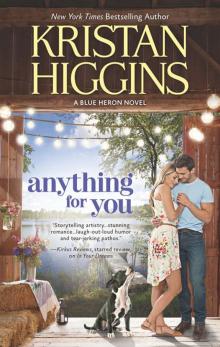 Anything for You
Anything for You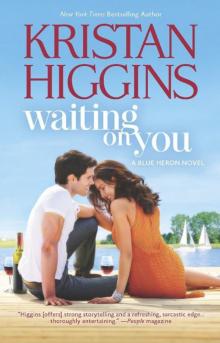 Waiting on You
Waiting on You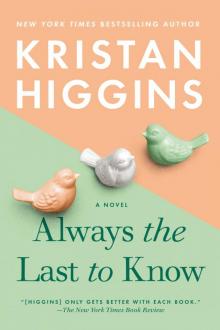 Always the Last to Know
Always the Last to Know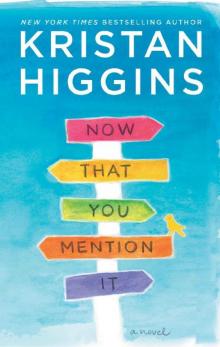 Now That You Mention It
Now That You Mention It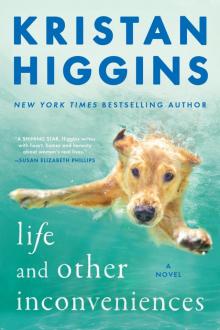 Life and Other Inconveniences
Life and Other Inconveniences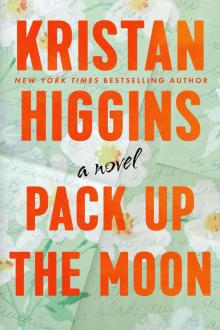 Pack Up the Moon
Pack Up the Moon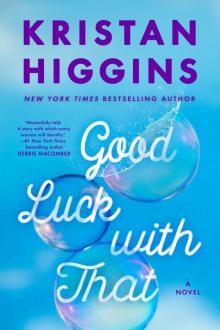 Good Luck with That
Good Luck with That![Blue Heron [2] The Perfect Match Read online](http://i1.bookreadfree.com/i/03/25/blue_heron_2_the_perfect_match_preview.jpg) Blue Heron [2] The Perfect Match
Blue Heron [2] The Perfect Match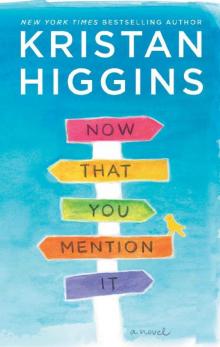 Now That You Mention It: A Novel
Now That You Mention It: A Novel